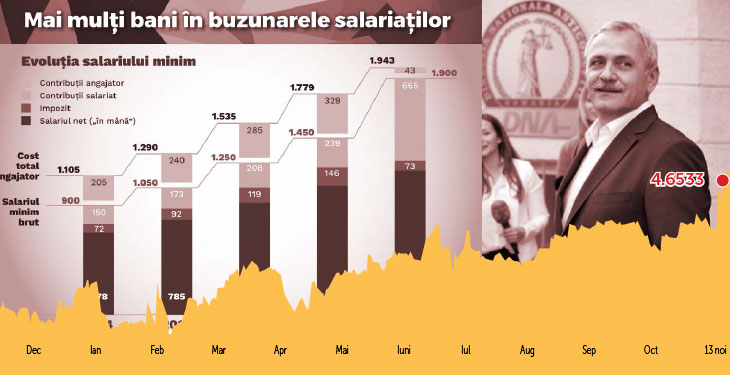Romanian currency has reached the weakest exchange rate since August 3, 2012 to date against the euro; with a reference from the National Bank of Romania of 4.6495 lei for one euro, on Monday, 1.05 bani (0.23%) higher than the level on Tuesday. It was the fifth depreciation session for the leu, at the Central Bank benchmark, in a context of economic and political uncertainty unseen in recent years.
The threshold of 4.6 lei per euro was broken as significant tax changes were announced and immediately adopted by the PM Mihai Tudose by Government Emergency Ordinance. Criticized by trade unions, employers’ associations and tax experts, these changes include, among others, the transfer of social contributions from the employer to the employee, a reduction of income tax and a cutting of the contribution to mandatory private pension funds. The weighty and sudden fiscal changes would take effect from January 1, 2018, unless they were canceled, in whole or in part, by Parliament’s vote, by the intervention of the Presidency or by a decision of the Constitutional Court, following a referral from the People’s Advocate.
The new minimum for the Romanian currency, on Monday, continues a long-lasting trend of more than 12 months, amplified in recent weeks. The indictment of the PSD leader – the main Romanian ruling party – introduces new uncertainties, also from a political perspective.
The Romanian National Anticorruption Directorate (DNA) has indicted Liviu Dragnea for fraud against European Union (EU) funds, for creating an organized criminal group, and for misusing his position for personal gain. Eight more persons have been indicted on similar charges.
The DNA has explained that their case comes as a result of two investigations conducted by the OLAF into projects financed by the European Regional Development Fund for road construction in Romania, which were concluded in May and September 2016.
OLAF found evidence suggesting collusion between the beneficiary of the funds, public officials and the contractor, including falsification of documents during the procurement procedure. Some of these documents were also used in support of the claim which the beneficiary submitted to the Managing Authority, resulting in the payment of EUR 21 million from European Union funds.
OLAF’s investigations were concluded with a financial recommendation to the Directorate-General for Regional and Urban Policy, to recover the full EUR 21 million, and with judicial recommendations to the Romanian National Anticorruption Directorate to initiate judicial actions into the matter.
